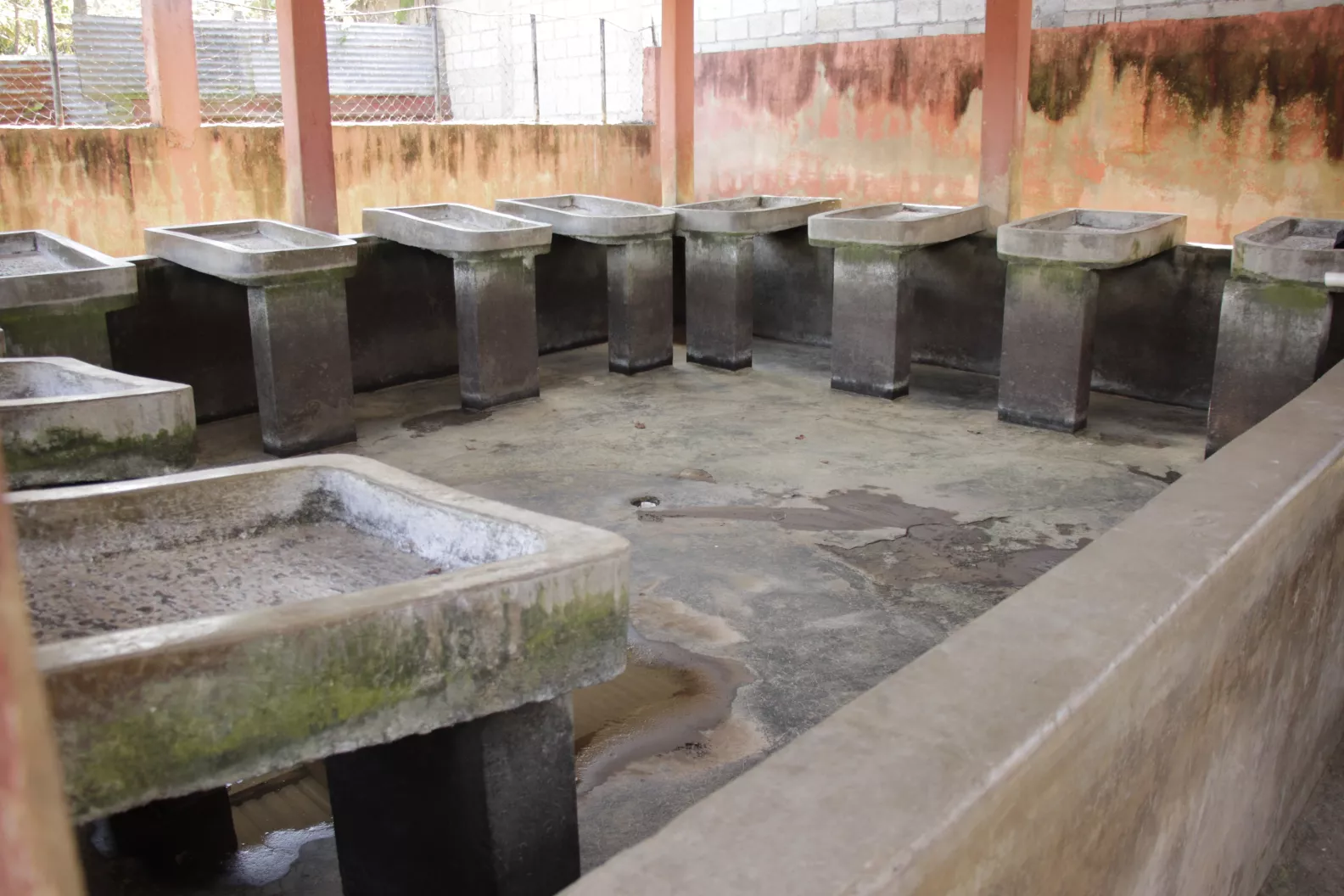
The village of Canalitos is located in zone 24 of Guatemala City, about 10 km from the city center, and is made up of eight communities known as cantons. The communities have faced historic difficulties in accessing water. In October we visited the communities and their inhabitants who shared with us why they have always felt that their right to the water has been violated and how the situation has worsened in recent years. In November 2019, the Municipal Water Company of Guatemala (EMPAGUA) completely interrupted the water supply and the 39,000 people living throughout the eight cantons were left without water for three months. The situation was very difficult, according to a resident from canton Las Delicias (4,500 inhabitants), who spoke with us while we visited the communal washing station which, at the time of the visit, had been empty for seven months: “we had no water at all; the water they sent us in the pipes was dirty and we got sick; all of us women were sick to our stomachs. Then came the pandemic and they told us to wash our hands all the time, but with what? Nobody, no institution, cared about us and there are no hospitals here… and that’s how we got through the pandemic.”
At the request of members of the Community Development Councils (COCODEs) and the Unified Neighborhood Committee (CUB), the Human Rights Ombudsman’s Office (PDH) facilitated a dialogue between the municipality of Guatemala, EMPAGUA and the affected population. Thanks to the insistence by representatives from the cantons, EMPAGUA finally began to send piped, untreated water to the communities. Two years later, on April 29, 2022, EMPAGUA and the Municipality started operating the C-4 Well. The following month, treated water became available and remains available, however its supply is very limited arriving only two out of 15 days.
“The struggle for water in Canalitos is historical,” said a community representative whose ancestors were among the first settlers to the area. In 1720, the State granted land concessions, located on a forested mountain about 10 km east of the capital, to 20 families who had emigrated from the Verapaces: “they earned this right because they participated in different wars of the time”.
A couple of centuries later, during the Ubico government (1931-1944), many lands were expropriated and reassigned, along with adjoining lands to what is now Zone 16 of Guatemala City. These were communal lands (the Canalitos ejidos) destined for food production for consumption and sale. In the 1950s, due to conflicts between neighbors, the community of Canalitos asked the municipality to adjust the boundaries of the land, but the municipality never resolved their request nor bothered to provide basic services such as roads, hospitals, water, etc. It was thanks to the efforts of the neighbors and international cooperation that they now have roads and wells.
As for the administration and control of water, this became EMPAGUA’s responsibility: ” our ancestors always said that the municipality did not want to respond to our request [for distribution and delivery of individual land titles], because they considered Canalitos as part of their wealth. Now we understand they were right.”
Why Canalitos ran out of water
According to representatives of the COCODEs and the CUB, the water supply was interrupted in November 2019 because the water pump, for the only well that was working out of the five managed by EMPAGUA in Canalitos, burned out. It burned out because there was no longer any water to pump due to declining groundwater. According to investigations carried out by the residents, this decrease in water flow is related to the construction of wells and a direct road to the residential neighborhood located in zone 16, bordering zone 24, by the company Acuífero San Miguel S.A.. In addition, the company currently wants to install electrical wiring to feed the water pump of a well that now runs on fossil fuels. They had to cut down hundreds of trees in order to carry out this work but they never bothered to obtain the necessary permits nor an Environmental Impact Assessment.
”Here the water resource is becoming increasingly scarce. The impact that the company is causing on the aquifer is tremendous. The aquifer is already over-exploited; it is not a question of just using the water, it is being over-exploited…. And with this situation, what will be left for coming generations?”
The PDH managed to summon the state institutions involved to participate in a round-table for dialogue that was created as a result of the 2019 water cuts, including the Ministry of Environment and Natural Resources and the National Forest Institute. They did not, however, manage to ensure the company comply with the legal requirements necessary for the construction works. In turn, the PDH demanded that the municipality of Guatemala take charge of supplying water to the population while the water pump was being fixed. The municipality contracted a private service to deliver a 200 liter barrel to each family once a month, when the average daily consumption is 50 liters. It is also important to note that the pump that was finally installed to replace the one that broke is three times less powerful than the previous one.
The company’s offer: a “poisoned chalice.”
The population is desperate, according to the people we spoke with, because EMPAGUA was providing such poor service. That is when the company Acuífero San Miguel S.A. appeared on the scene and told the people that it will provide water in exchange for permission to work on the power lines. So far only the Lourdes canton has accepted this offer, while the residents of the other cantons continue to resist the privatization of water and demand that the corresponding state institutions fulfill their duty to guarantee access to drinking water.
A neighbor commented: “If you have the resources you can move to the interior of the country; but those of us who cannot go elsewhere are going to suffer without access to this vital liquid”.
As a result of their activism, the inhabitants fighting for access to water in Canalitos are facing all kinds of aggressions. They have been robbed of several cell phones and a computer; they are being watched at their homes; they are being persecuted and abused; they are being intimidated with firearms and receive death threats. They have also suffered defamation on social networks. All this for demanding their right to water and the protection of water sources from the overexploitation caused by construction companies.
In October 2022, we visited Canalitos and met with their representatives, who shared with us their path of struggle. The people who gave us their testimonies asked us to withhold their names for fear of reprisals.
